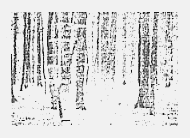
科目: 來源:不詳 題型:閱讀理解
查看答案和解析>>
科目: 來源:不詳 題型:閱讀理解
查看答案和解析>>
科目: 來源:不詳 題型:閱讀理解
| A.How a good teacher acts in class |
| B.Acting: natural expression of fixed words and movements |
| C.Teaching: a student-centered creative process |
| D.Similarities between teaching and acting |
查看答案和解析>>
科目: 來源:不詳 題型:完形填空
 ed him . I told him what a bad 43 I thought he was and he was a(n) 44 to other people on the road . His face turned 45 . I warned him not to drive 46 in the future so that everyone else could enjoy a long life .
ed him . I told him what a bad 43 I thought he was and he was a(n) 44 to other people on the road . His face turned 45 . I warned him not to drive 46 in the future so that everyone else could enjoy a long life . hen I decided to look 51 the whole matter as a great joke !
hen I decided to look 51 the whole matter as a great joke ! —the driver of the yellow car , didn’t 55 my rudeness to him .
—the driver of the yellow car , didn’t 55 my rudeness to him .查看答案和解析>>
科目: 來源:不詳 題型:閱讀理解
 ntal relaxation . It is good for all ages and is especially suitable as a family and group activity .
ntal relaxation . It is good for all ages and is especially suitable as a family and group activity . B. a set of outdoor tools
B. a set of outdoor tools 查看答案和解析>>
科目: 來源:不詳 題型:完形填空
查看答案和解析>>
科目: 來源:不詳 題型:完形填空
 共35分)
共35分)| Henry Paulson’s trip to China | |
| (71)_____ | July 30 |
| The (72) _____ place of his visit | Qinghai Lake |
| The (73) _____ of his visit | To hold talks in Beijing with President Hu Jintao that will focus on the Strategic Economic Dialogue, high-level discussions (74)_____last year in an effort to deal with economic tensions between the US and China. To (75)_____long-term issues such as working with China to rebalance its growth and increase the flexibility of its currency and also to deal with short-term issues as they arise. |
| The important people he will visit | (76)_____Hu Jintao and Vice Premier Wu Yi |
| The (77)_____for his visit | Under pressure from (78)_____ |
| Which session is to be held next time? | The(79)_____session is to take place in China later this year. |
| What is to be talked about with Hu Jintao? | Issues of (80)_____to Congress. |
查看答案和解析>>
科目: 來源:不詳 題型:閱讀理解

 n that he had thrown down. His tracks showed that for two days he had circled in the forest, wit
n that he had thrown down. His tracks showed that for two days he had circled in the forest, wit hin 200 yards of the road. His senses were so dulled by fear and tiredness that he did not hear the cars going by or see the lights at night.
hin 200 yards of the road. His senses were so dulled by fear and tiredness that he did not hear the cars going by or see the lights at night. ervation. A skilled woodsman always keeps an eye on his
ervation. A skilled woodsman always keeps an eye on his  surroundings. He notes that the shape of a mountain, the direction water flows through a swamp, and the way a tree leans across a path. With these in mind, he may be turned around many times, but he is seldom lost.
surroundings. He notes that the shape of a mountain, the direction water flows through a swamp, and the way a tree leans across a path. With these in mind, he may be turned around many times, but he is seldom lost. in the forest, at the very beginning, he would __________.
in the forest, at the very beginning, he would __________.查看答案和解析>>
科目: 來源:不詳 題型:閱讀理解
 To date, the most successful att
To date, the most successful att empt to do so was the cloning of a gaur, a rare ox-like animal from southeast Asia. Scientists used a cow to bring the cloned baby gaur, named Noah. Two days after birth, however, Noah died from a common bacterial infection. Other endangered species that may be cloned include the African bongo antelope (邦戈羚羊), the Sumatran tiger, the cheetah (獵豹), and the giant panda. Next, could we really clone extinct animals?
empt to do so was the cloning of a gaur, a rare ox-like animal from southeast Asia. Scientists used a cow to bring the cloned baby gaur, named Noah. Two days after birth, however, Noah died from a common bacterial infection. Other endangered species that may be cloned include the African bongo antelope (邦戈羚羊), the Sumatran tiger, the cheetah (獵豹), and the giant panda. Next, could we really clone extinct animals? itely not a monkey. But what about an extinct animals as unique as the panda? What species could possibly serve as a surrogate mother?
itely not a monkey. But what about an extinct animals as unique as the panda? What species could possibly serve as a surrogate mother? e a monkey as a surrogate mother
e a monkey as a surrogate mother查看答案和解析>>
科目: 來源:不詳 題型:閱讀理解
查看答案和解析>>
湖北省互聯(lián)網(wǎng)違法和不良信息舉報平臺 | 網(wǎng)上有害信息舉報專區(qū) | 電信詐騙舉報專區(qū) | 涉歷史虛無主義有害信息舉報專區(qū) | 涉企侵權(quán)舉報專區(qū)
違法和不良信息舉報電話:027-86699610 舉報郵箱:58377363@163.com